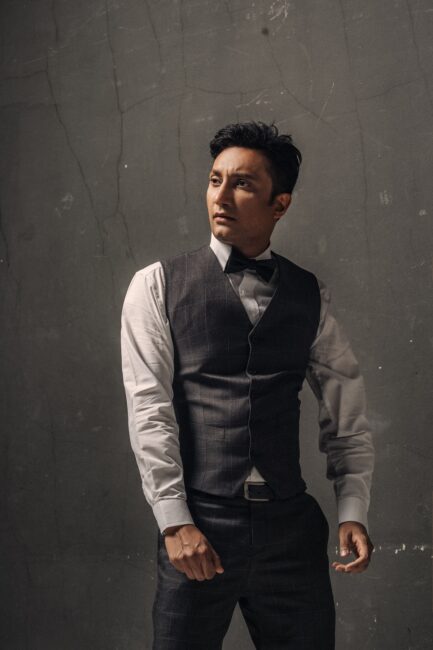Franklin Livingston is a versatile Pakistani-American actor. He specializes in dramatic roles and has proven his acting abilities in other genres of film, including comedy as well. Franklin was born in Pakistan whereas most of his education has been completed in the U.S. Here, in addition to studying at Northwestern University, Franklin gained extensive acting training from Atlantic Acting School, New York Film Academy, Moscow Arts Theater, the Meisner Studio of Tisch School of the Arts at New York University and Western Connecticut State University. He also received training in filmmaking and directing from New York University, and Yale University. Franklin then went on to study at a world-renowned institution, Guildhall School of Music and Drama, London, where he was trained in Shakespeare and contemporary acting. In addition to studying at institutions, Franklin got trained for 3 years in classical and modern singing by Melania Maldonado, Speech and Voice by Shane Ann Younts and Lenore Harris, and Acting for American Sitcoms by David Ross. Franklin is a trained dancer, he learned Latin and Ball Room Dances at various studios in NYC and Chicago, as well as Bollywood dances by Pooja Narang in New York City. Legendary dance teacher Saroj Khan trained Pooja.
Franklin has had an unmatched opportunity to represent a growing number of Pakistani people in the US who are under-represented in Hollywood. Currently, there is no person of Pakistani origin in Hollywood’s big-budget movies and TV networks that has the background training Franklin has. Currently, Riz Ahmed has been in the news a lot due to his dramatic acting. However, Riz is a British-Pakistani which makes him distinctly different from Franklin Livingston. Franklin’s unique accent, enchanting voice, alluring charisma, and captivating presence makes him stand out among all actors Hollywood has cast from Southeast Asian backgrounds.
Franklin has broad training from highly experienced professionals in the areas of drama and the more serious cinematic roles. In films produced in the United States, there are no such leading roles that are filled by qualified Pakistani actors. Franklin has spent significant time and effort acquiring the necessary training and expert guidance to fill these roles. Franklin has the particular skills and personality necessary as an American actor to proudly and personally take on the privilege of shedding light on many important socio-political issues. Including representation or the cross-cultural issues faced by recent immigrants.
Franklin envisions changing the way stories are told in America while empowering day-to-day heroes. In his films, Franklin has shown the heroism of average men and women. He believes heroes don’t have to be fictional or over-the-top good-looking men and women. Since those are standards set by humans and are not closer to the principle of nature and the Universe. Franklin believes heroes are always born among average people, and they live among us, helping us on a day-to-day basis, making our world a better place.
Franklin not only wants to help tell realistic stories, but he also acts out these stories. He likes to be practical. With his voice, body, and skills that he has been honing for years, he can show Hollywood that they have been waiting for a strong dramatic lead like him, but they simply haven’t even realized it yet.
Along with being a gifted actor, filmmaker, and producer, Franklin is an empathic person. He loves being an active member of the community through his participation in social justice-based activities. He also enjoys cooking, traveling, sightseeing, motorcycling, driving through states, and jet-skiing. Franklin has observed the way other actors with brown skin have gained some headway, but they have typically done so through a particular type of comedic role. Even still, most of these actors tend to be from India or other southeast Asian countries and not from Pakistan. Although Pakistan and India share some commonalities, their culture, language, human behaviors, and social etiquette make them distinctly different nations, which Hollywood has yet to present in its productions. This difference is not in contrast to those that the British and Americans have in terms of their anthropology. Countless people of color in the United States and a significant community of Pakistani immigrants in the United States have waited long to see themselves in Hollywood movies and television shows with a true representation. Franklin Livingston is ready to face this challenge, and that day is not far away when Franklin will tell stories about Pakistani Americans through his inimitable work in films and television.
Let’s start by telling us about your career.
I am a trained actor, filmmaker, and producer. I received extensive training from Atlantic Acting School, Moscow Art Theatre, New York Film Academy, and the Meisner Studio of Tisch School of the Arts at New York University. I received training in filmmaking and directing from New York University, and Yale University. I also trained at Guildhall School of Music and Drama, London. I prefer the more serious, dramatic roles that push and challenge my abilities.
Q: Please tell us how you make sure people will be fans of your work?
I not only work very hard at everything I do, but I am a very genuine person. People often equate acting with pretending, but it is so much deeper than that. When I am acting, I am portraying a character that I have taken a very long time to get to know. You find a way to connect with the role you are “playing” so that there is personal truth in there too and when you get very good at doing this, your audience won’t be able to tell where you have blurred the line. It will feel very sincere instead, which is what viewers appreciate and deserve.
Q: Please tell us the one thing that separates you from your competition.
I do have a unique perspective to bring to the table. Currently, there is no person of Pakistani origin in Hollywood’s big-budget movies or TV networks that has the training I do. Especially not one playing a dramatic role that will be taken seriously and not a “funny guy” character. I would love to put my extensive experience to good use and not only go up against “the competition” for a leading serious role one of these days, but actually get a call back for it!
Q: And to finish this section, please tell us what is the one major key to your success?
I am very disciplined and do not believe in shortcuts. If you want to achieve your goals, you need to put in the work. It always disappoints me when I see an actor that has completed their training, and then they think that is the end. Really, with any career you should be continuing your training up until the day you retire. I do acting exercises constantly to stay sharp. I also love to talk with strangers, or at least I used to a lot more pre-covid, and get to know their stories. I will often take an afternoon drive along the countryside and stop to talk with someone I have just met. Going into Manhattan on the Subway just to people watch is something I find very enjoyable too. These things not only keep me connected to my fellow human beings, but it is also like building a real-life character catalog of all the different people I meet that I could draw inspiration from whenever needed.
Q: For our readers that may be interested in acting, filmmaking, and producing, what advice can you give entrepreneurs just starting out in the industry?
Be sure to get the right educational foundation. Research acting schools that you are considering. When you have completed your education there, be sure you never stop self-training.
Q: In what ways has the Covid-19 pandemic had an effect your career in the movie industry?
Speaking as both an actor that has auditioned with other actors, that turned out to not be so great when we got on set, and as a producer, auditions that are done mostly via zoom now, are awful for picking up on so many of the meaningful but more subtle details that you notice when auditioning in person. In audition rooms, you can see the person enter, you see how they walk and stand. Were their hip sockets relaxed, shoulders relaxed, jaw relaxed? Do they look the part? Like someone that will put the needed effort in and behave like an actor both in the audition room and on the film set. Small acts of respect like turning the phone off before entering the audition room used to be a big indication of that, which is now lost in the “zoom room”. Then there is the emotional connection that you simply cannot make with your scene partner over zoom. So when we show up on set, it can produce some very dysfunctional results. Sometimes you will have very underprepared or undertrained actors that think all they need to do is recite their lines perfectly, but they have completely forgotten how to make that emotional, mental, physical, or spiritual connection with their scene partner(s) and get on moment-to-moment work to re-create a scene on set that they read on a piece of paper.
Q: What is your “Why”? In one sentence, why do you get up in the morning?
I get up because I truly love what I do and look forward to doing it each day.
Q: In one sentence, what is the most important thing one has to do to be a great leader?
To be a great leader, one should know how to relate to his or her followers with empathy. Great leaders are able to step in the shoes of their followers and feel what their followers feel about almost everything.
Q: In one sentence, describe how important your fans are to you?
My fans are very important to me, they both humble and inspire me to keep going.
Q: In one sentence, describe a positive way that technology can make the world a better place?
Technology can help bring much-needed joy through entertainment.
Q: In one sentence, tell us something positive to motivate our readers?
You have already made it through all of your worst days without breaking so far.
Q: In one sentence, tell us how you start your day to get ready?
Starts around 5 am with a very simple breakfast including some caffeine, then warm-ups which are sometimes physical, sometimes vocal, sometimes combined.
Q: In one sentence, describe how you handle rejection and setback?
In this industry, you have to just keep pushing forward through the no’s until you get a yes.
Q: In one sentence, describe how you keep your sanity in a competitive environment?
I stay centered on what is important to me and focused on my goals, along with keeping as healthy as possible.
Website
https://www.franklinlivingston.com/
Instagram
https://www.instagram.com/franklinlivingston/
Facebook
https://www.facebook.com/Franklin-Livingston-313595142578559
Twitter
https://twitter.com/franklin_diary
Linkedin
https://www.linkedin.com/in/franklin-livingston-55b260174/






















